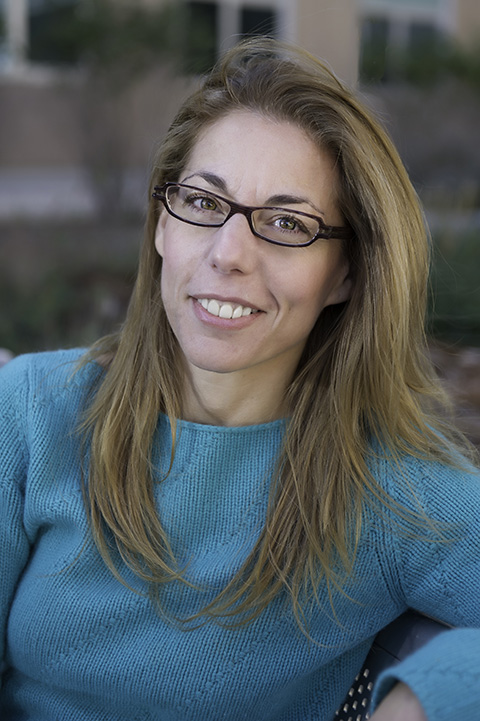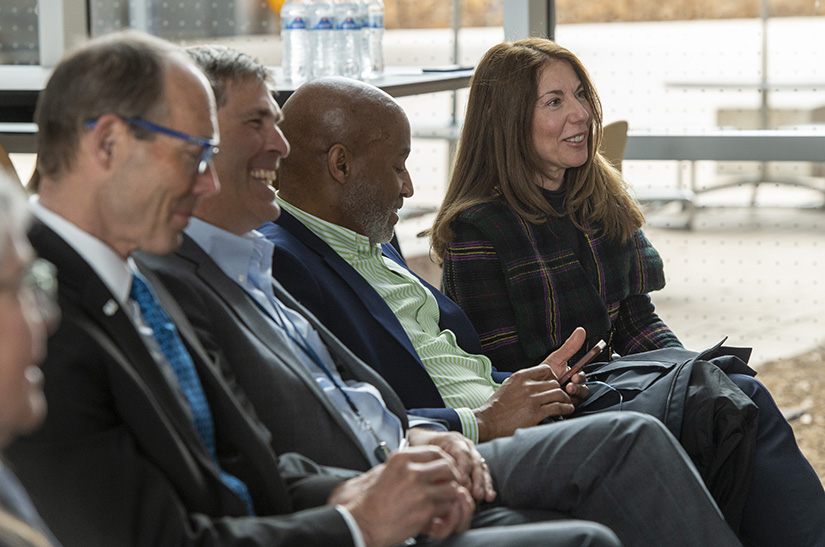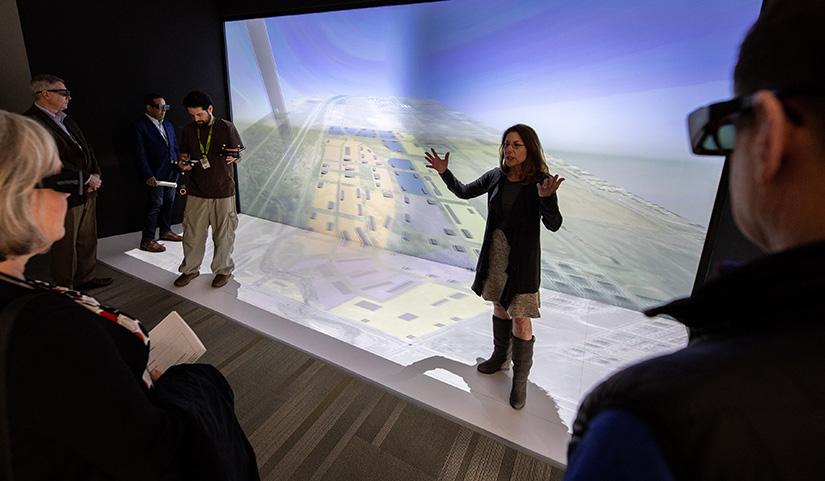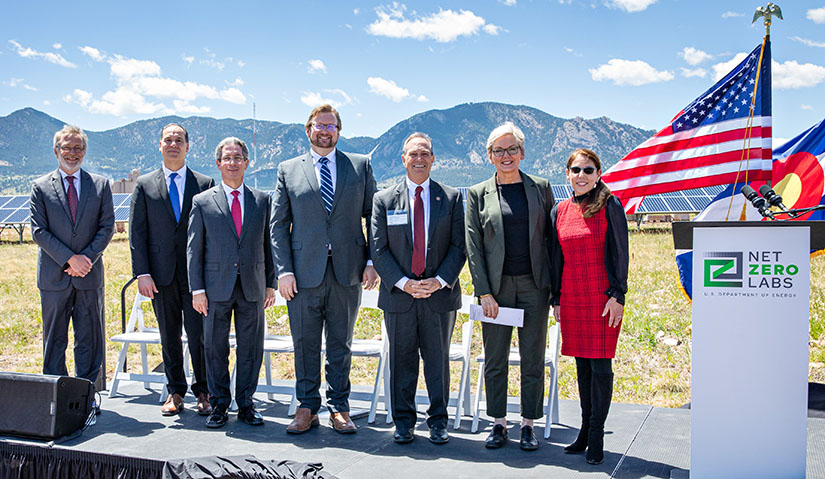Intelligent Campus Program Manager Michelle Slovensky Named Distinguished Member of Operations Staff
Understanding the Whole and Its Parts Until You Get to the Heart
Michelle Slovensky is a systems thinker.
The National Renewable Energy Laboratory (NREL) Intelligent Campus program manager’s superpower is the ability to comprehend systems, processes, and ideas from a 30,000-foot level and at a granular scale while recognizing the interconnected parts that make up the whole. She sees the forest through the trees, the trees within the forest, and each animal, flower, pinecone, and fungi that constitutes the ecosystem.

As a child she enjoyed investigating and documenting the living world to learn how organisms operate and interact. A burgeoning artist with a deep appreciation for science, Slovensky once boiled an artichoke, peeling it back layer by layer to understand the vegetable at its core. She documented the process in an artwork titled, “The Death of an Artichoke.”
“This was so revealing, it set me on my path as a lens to approach everything I do, because the whole was comprised of parts, and then you get to the heart of it,” Slovensky said. “It enables me to understand the whole evolution”
She has brought this same energy to NREL since she began working at the laboratory in 2010. After serving as the senior Sustainability manager for half a decade, in 2015 she founded the Intelligent Campus program to step beyond recording building performance and documenting sustainable practices. Her goal was to create a living laboratory system that used the ideas developed in labs to inform decisions that better the laboratory as a whole.
“I am empowered by taking the results and the lessons known as a feedback loop from the science that’s being generated,” Slovensky said. “How can I use that science as information to implement and influence those systems? Because, in a sense, our scientists are developing all the tools in the toolbox.”
In the spring of 2024, Slovensky was honored for her groundbreaking leadership and named one of the year’s thirteen Distinguished Members of Operations Staff for “guiding innovative facility, campus, and building approaches that leverage and expand NREL's mission and position NREL as a leader in the global energy transition.” Slovensky is recognized by DOE for positioning NREL as a sustainability leader and developing solutions that can be replicated at other federal facilities.
She is passionate about working for an organization where big ideas inform big changes.
“I get very charged by knowledge and the integration of things,” Slovensky said. “So, it’s the perfect environment that we’re working in, to understand how to synthesize everything that guides what you want to transform.”

Allow the World To Inform Your Perspective
All great minds have an origin story. For Slovensky, it was one of a young girl finding her place in the big city. Before she was a systems thinker at NREL, she was an artist and a scholar from Staten Island.
Slovensky was raised in the hustle and bustle of New York City. As an introverted, academically inclined eldest sister, there were few things she enjoyed more than her family’s seasonal escapes to their cabin upstate. Her favorite summer activities were hiking, boating, visiting outdoor sculpture installations, and reading in the woods.
She reveled in finding a quiet place and taking it all in. Inspired by her physician father’s love for the sciences, Slovensky’s literary companions were Emily Brontë, Henry David Thoreau, and Charles Darwin. She was captivated by the ways the characters in their stories interacted with nature and the landscapes they inhabited.
“I was fascinated by the natural word, versus man-made stuff,” Slovensky said.
This fascination informed her collegiate aspirations. As an undergraduate at the Rhode Island School of Design, she studied architecture. Even before sustainability was cool, she wanted to study green architecture, which aims to minimize the environmental impact of buildings through improved efficiency and modernization.
During graduate school at Harvard University, she pivoted her focus to landscape architecture and ecology. The coursework was a synthesis of art and science.
“You were understanding the nature of how science principles and ecology were activated,” Slovensky said. “But your toolbox was all living—you have earth, plants, water. So that shift to me was really exciting and it involved more ecological systems and living organisms.”
Graduate projects took Slovenksy across the world from North America to Europe, Asia, the Middle East, and South America. Through travel, she witnessed the interactions between nature, culture, and history.
“Everything’s a quilt,” Slovensky said. “You’re building pieces by association that result in the whole. I think that’s what I’m all about. You’re looking at how the parts aggregate the whole. But you have a vision of what the whole can be.”
Intelligent Campus Origin Story
Following graduate school, Slovensky pursued many opportunities in interior architecture, river restoration, and sustainability. From 2006 to 2007, she served as the vice president of the Guatemala-based digital research company, Perspectiva. From 2007 to 2010, she was the director of sustainability for the Matrix Design Group.
When Slovensky joined NREL in 2010, the Research Support Facility (RSF) at its Golden, Colorado, campus was nearing the end of construction. When the project was completed in June 2010, it was the largest net-zero energy building in the world and stood as a monument to energy-efficient, sustainable design. As the laboratory’s senior Sustainability manager, Slovensky recognized this as a symbolic achievement, yet viewed the RSF as a passive building.
“I didn’t see it as an active living lab because it wasn’t breathing or doing anything, in my opinion, I just felt like we were recording the performance.” Slovensky knew more could be done with the information generated at the laboratory. So, she moved to create a new program that utilizes the NREL campus to promote research and achieve operational excellence by deploying cutting-edge control and analytics technology.
“I founded Intelligent Campus because I wanted a living laboratory system and I wanted to embed the idea of science, which is nature, into the tectonics of the way we build and operate things,” Slovenksy said. “I want to aggregate all that information to make a living, working system, so that it ties together culture, people, the land, and energy to drive long-term sustainability and health.”

However, Intelligent Campus did not evolve overnight. Slovensky collaborated with Bobi Garrett, NREL’s former chief operating officer, and principal scientist Kenny Gruchalla to develop a program that would utilize data to make NREL a living laboratory. When Julie Baker joined NREL as the new deputy director of laboratory operations, she gave Slovensky the green light to separate Intelligent Campus from Sustainability.
Although sustainability is a guiding principle for Intelligent Campus, the program has many tenants, including carbon management, resilience, and the circular economy. Intelligent Campus works to fulfill multiple aspects of NREL’s mission, such as synergizing strategic partnerships, advancing science and technology, and operating and designing campus facilities.
NREL sits at the nexus of innovation and action. The laboratory does not commercialize technology, but as Slovensky said, it is a conveyor of science. Through Intelligent Campus, Slovensky aims to add value to NREL and the DOE laboratory system and share these big ideas with global companies.
Slovensky is also collaborating with Bill Farris, chief external development officer, to establish the Global Energy Park as an epicenter of collaboration among industry, government, and academia to research and create global renewable energy and carbon management technologies.
“We’re trying to synergize, hybridize, integrate, and evolve labs to scale. We take what we learn in the richness of the national laboratory system, and we work with partners to elevate and accelerate that commercialization to market,” Slovensky said. “If all we did was just behind our doors, as we do great science, and it doesn’t reach the outside market, we haven’t really done our job to combat climate change.”
Bill Livingood, laboratory program manager for partnership development, recognizes Slovensky’s contributions and impact.
“Many years ago, NREL was at a pivotal moment in the field of advanced building controls and digital twins, and thanks to Michelle’s leadership, NREL was able to make significant strides in propelling this research forward,” Bill said. “Through Michelle’s outstanding efforts and highly collaborative approach, things began to take off, where NREL is now considered an international leader by our DOE sponsor and research community, where our research receives accolades for real world relevancy. This change in reputation and funding circumstance was the direct result of Michelle’s leadership and partnership with our building science researchers.”

Collaboration for Success
To fully realize Intelligent Campus’ vision of creating a living laboratory, Slovensky hopes to inspire increased collaboration among NREL’s offices and directorates. Although there are some challenges to this approach, Slovensky views those challenges as opportunities: “I want to be as creative as possible.”
At its core, this is the essence of resilience. Both in work and our professional ethos.
“No matter where you are, you need a foundation,” she reflected. “This is about learning how to be resilient. So, not only do you practice resilience, you have to be resilient yourself.”
As Slovensky and the Intelligent Campus team continue developing solutions to improve the laboratory, she hopes the voices and ambitions of her colleagues will shine through this work. To improve the laboratory ecosystem, you must be mindful of each part.
“Whenever I’m crafting things, I’m representing a group of individuals, and that’s a really fun thing to me. That’s what collaboration means,” Slovensky said. “I am very happy, and blessed, and honored to do what I do.”
Visit Intelligent Campus to learn the history of the program and how it is enabling NREL’s mission.

